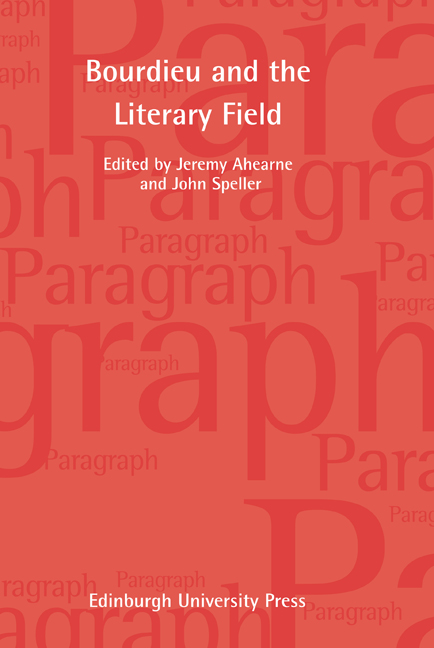Book contents
- Frontmatter
- Contents
- Introduction: Bourdieu and the Literary Field
- How Field Theory Can Contribute to Knowledge of World Literary Space
- Autonomy Revisited: The Question of Mediations and its Methodological Implications
- The Literary Field and the Field of Power: The Case of Modern China
- Between Repression and Anamnesis: Pierre Bourdieu and the Vicissitudes of Literary Form
- Reading and Reflexivity: Bourdieu’s Faulkner
- Fields and Fragments: Bourdieu, Pascal and the Teachings of Literature
- On an Enigmatic Text by Pierre Bourdieu
- Apollinaire, Autumn Ill
- Notes on Contributors
How Field Theory Can Contribute to Knowledge of World Literary Space
Published online by Cambridge University Press: 17 September 2020
- Frontmatter
- Contents
- Introduction: Bourdieu and the Literary Field
- How Field Theory Can Contribute to Knowledge of World Literary Space
- Autonomy Revisited: The Question of Mediations and its Methodological Implications
- The Literary Field and the Field of Power: The Case of Modern China
- Between Repression and Anamnesis: Pierre Bourdieu and the Vicissitudes of Literary Form
- Reading and Reflexivity: Bourdieu’s Faulkner
- Fields and Fragments: Bourdieu, Pascal and the Teachings of Literature
- On an Enigmatic Text by Pierre Bourdieu
- Apollinaire, Autumn Ill
- Notes on Contributors
Summary
Abstract:
Anglophone scholars with a postcolonial perspective have forcefully challenged eurocentric definitions of comparative literature and the limits of national frameworks. But this debate ‘offers few methodological solutions to the pragmatic issue of how to make credible comparisons among radically different languages and literatures’ (Emily Apter). Moreover, some have even rejected the very notion of comparison, impugning its association with nationalistic and imperialistic perspectives or its unsuitability for the study of historical, dynamic and multidimensional processes. This article offers a synthetic overview of the tools field theory provides for literature studies in a global perspective without sacrificing methodological rigour and empirical validation. It discusses the epistemological principles set out in The Craft of Sociology to address problems of comparison; the possibility of rational dialogue between different theoretical frameworks; the properties which make Bourdieu's model more complete than other approaches to literary phenomena; and finally, developments of field theory and issues raised by globalization.
Keywords: Pierre Bourdieu, literature, globalization, field theory
This article focuses on the conceptual tools and empirical examples found in Bourdieu's work and in research inspired by his field theory on literature in a worldwide perspective. To account for Bourdieu‘s theoretical research, I will situate it in the space of contemporary approaches to culture and underline how some developments of his theory have been stimulated by other frameworks. As the history of science shows, the dialogue between seemingly distant disciplinary areas is a key condition for progress in knowledge,and the formulation of new laws is generally a result of the effort to explain and reconcile different existing theories.
Anglophone scholars have contributed decisively to questioning the premisses and methods of literary history. Cultural studies, for instance, has promoted an anti-disciplinary way of thinking.This attitude risks slipping into eclecticism and impressionism, but it helps scholars to go beyond mental boundaries, which constitute an obstacle to cognitive progress. Labels such as ‘imagined community’, ‘cosmopolitanism’, ‘world literature’,‘postcolonial’ and ‘diaspora’ studies, or ‘transnationalism’, are responses to the need for a rejection of national perspectives and elaboration of new theoretical tools. They have also questioned the classical Marxist approach to society and culture: it is not enough to consider class position, since many other social differences—ethnicity, religion, politics, language, gender and so on—can play an important role.
- Type
- Chapter
- Information
- Bourdieu and the Literary FieldParagraph Volume 35, Number 1, pp. 10 - 29Publisher: Edinburgh University PressPrint publication year: 2020



